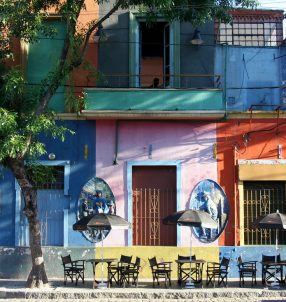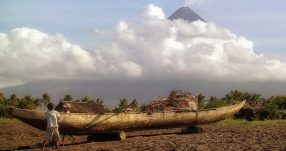Backpacking can seem overwhelming before your first trip, but it need not be. Follow these tips to plan the ultimate backpacking experience.
Photo By: NoirKitsune
Choose a Rough Area

Photo By: Mario Mancuso
Before you set off backpacking you’ll have to decide where you want to go. It’s best to pick a region as opposed to taking off on a round the world adventure. Not only will it be cheaper this way, but you’ll be able to get into and explore the region better if you make a focused effort on it. For example: choose Southeast Asia, or Southern Asia, or South America, or Central America, or North America, or Western Europe, or southern Africa. You get the idea! Choose a geographic area and get amongst that area. Plus, this way you don’t have to book expensive flights taking you from continent to continent, instead you can choose cheaper and more experiential overland travel options like buses, trains or ferries.
Plan to travel slow – don’t plan to visit a new place every second day because this is a sure fire way to spend all your time in transit and not actually really get to know a place. Just as there’s more to Paris than the Eiffel Tower and you need to spent time in a place to see the hidden sights.
Don’t Book Transport in Advance
Book your flight in, obviously, and book major flight points if you think prices will go up or if a flight is required around a major event (like a local festival or Christmas) but other than that go with a flow and book transport as it plays out where you want to be when. It’s often hard to know exactly how long you want to spend where until you get there so try to book transport as you go. People in your hostel and other travelers can give you good tips on the best local transport options to take – it’ll be much easier to coordinate than researching online from back home where you’ll find plenty of out of date or incorrect information.
Don’t Book Accommodation in Advance
As with transport try to book accommodation on the run. So, for example, book your accommodation for your next stop when you know when you want to leave your current spot. Also, if you’re going to a nearby spot then often people in the hostel will be able to give you good tips on where to stay. Leaving things to the relative last minute means that you are agile. Love a spot? You can stay longer. Hate a spot and you can leave earlier. If your transport and accommodation aren’t all booked in ahead then you remain flexible.
If you plan on being somewhere for a major event then you should definitely book ahead though because accommodation can fill up and become extremely expensive.
Read Guide Books, Then Put Them Down

Photo By: Kevin Hale
Guide books are fine. They’re not the devil that some hipster backpackers might have you believe. They’re great so you can orientate around a place, know a bit of the history and get a glimpse of what the main sights are. But once you have an overview, you should put your guide book down and learn for yourself and actually talk to locals and other travelers about what the best things to see and do are. This advice is particularly relevant when it comes to guide books advocating where to sleep and eat. Things change and the best place to eat in a given city now is likely different to what it was 4 years ago. Plus, some of the best local haunts don’t make it into guidebooks. You don’t want to have your head down in a guidebook instead of experiencing a place that’s right there in front of you.
Chat to Others on the Road

Photo By: zoetnet
Other travelers are a great source of information. If you’ve just met someone in a hostel who’s just come from the place where you’re going, they will have a wealth of advice on what to see and do. Chat to the people staying in and working at your hostel. They’ll have more up to date information than your guide book! Plus, this is great way to meet potential travel buddies as well.
Go With the Flow
So you might have a rough idea about what you want to do on your backpacking trip. Like: I want to visit these 7 countries in Southeast Asia. Often you’ll need to incorporate this type of planning for visa requirements anyway. But that doesn’t mean you need to also know exactly what villages and islands you’ll visit in each country. Have a rough plan, then go with the flow. You’re bound to meet someone who says we’re going to X cool place tomorrow, wanna come? If you have everything planned out you won’t have the built-in flexibility to say yes to potentially amazing experiences. It’s hard to know what cool things will crop up while sitting on your couch back home, so leave some space for flexibility so you can say Yes! to things.
Plan for Longer Stays
You might think at first: Oh I’ll spend 5 days in Koh Tao (Thailand), but then realize you want to do a Scuba diving course so you’ll need to stay a few weeks. If you factor in some longer stays in some places then you’ll be able to say Yes to great opportunities, and you won’t be stressed that this throws your plan out of whack. Consider that you find a yoga or mediation course in India you’d love to do, or you decide to learn to snowboard in Canada, or you’re inspired by a 10 day trek in the Andes. If you’ve planned for some longer stays then you can do this type of thing that just crops up but you’d never imagined before you’d left off.
In essence planning the ultimate backpacking experience is about planning for the unexpected. The beauty of backpacking is that while you can set your compass, you never know where you’ll end up!
Read more about backpacking tips:
Classic Southeast Asia Backpacking Routes
Classic Backpacking in South America Routes
Classic Backpacking in Central America Routes
Classic Backpacking in North America Routes
Classic Backpacking in Europe Routes
Classic Backpacking in Australia Routes
Classic Backpacking in the Middle East and North Africa Routes
Classic Backpacking in the East and South Asia Routes
Backpacking on a Shoestring Budget
Tips and Tricks for Backpackers
How to Make Friends While Backpacking Solo
9 Beginner’s Mistakes Backpackers Make (and How to Avoid Them)
8 Surprising Things You’ll Learn While Backpacking
Why You Must Backpack in Your 20s
Backpacking Tips if You’re Older, Have a Child, Working or Taking a Dog
The Coolest and Most Unique Backpacker Hostels with a Difference
In adventure travel news, n innovative new natural desert reserve spanning 10 percent of the total area of Dubai has been launched in the UAE. The Marmoon Desert Reserve Project is set to be the site of several ecotourism projects and conservation efforts contributing to the protection and nurturing of the environment,…
Hot Topics
In adventure travel news, n innovative new natural desert reserve spanning 10 percent of the total area of Dubai has been launched in the UAE. The Marmoon Desert Reserve Project is…














